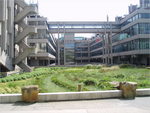Context

The University of Leeds is a research-led university, and so (obviously) is the School of Computing. This impacts on all the School's teaching, but particularly at Masters level.
The School of Computing at the University of Leeds currently offers three main single-subject degree programmes at undergraduate level: in Computing, Computer Science and Information Systems. Computer Science represents the "theory" end of the discipline, Information Systems is firmly at the "people" end, and Computing sits somewhere between the two. The three programmes share many modules, including introductory programming.
In addition, there are also Joint Honours degrees involving all three of these, a range of applied Computing programmes in the general area of Informatics, and a degree in Cognitive Science which combines elements of Artificial Intelligence, Psychology and Philosophy. Finally, the School also provides a number of elective modules, available to all students in the University.
There are also two taught programmes at Masters level and, for this first time this session, there are two "conversion" Masters programmes. One of the conversion programmes concentrates on Computer Science, the other on Information Systems, with the same biases as their undergraduate equivalents. These conversion programmes also share several modules, each again including introductory programming. Students on the other masters programmes are assumed to arrive with programming experience.
The intake in September 2005 was roughly 140 across all the undergraduate programmes (including Informatics and Cognitive Science, but excluding Joint Honours). The Masters level recruitment was around 25, five of whom where on the "conversion" programmes.
Programming is seen as fundamental to all of the programmes in which the School is either the main provider or a partner. The different programmes have different needs, however, so "introductory" programming can be found being taught in more than one place. The main undergraduate programmes include a 20 credit (one sixth of the year) programming module that runs all year during the students' first year. It is unusual (but not unknown) for them to encounter any programming in other modules apart from a 10 credit "Programming Project" taken by some in the second half of the year.
The provision for Masters students is different for the different programmes, but all have a 15 credit module (one twelfth of the year) and many have a further 15 credits. The traditional Masters programmes have a programming module, using Java, that assumes some level of prior experience. The students on the "conversion" Masters have rather different needs and so have a programming module that assumes no prior experience. It is this last that is the subject of this portfolio.
The introductory programming module that is the subject of this portfolio is therefore that designed for the students taking the conversion Masters programmes. Called "Programming Fundamentals" ("PRF" for short), the module runs in their first semester, and is worth 15 credits, representing a quarter of the students' time. This is followed in the second semester by "Software Engineering" ("SWE"). As the names suggest, the emphasis is rather different in each semester. Neither module assumes any pre-existing knowledge or any experience. Technically, the first module is a pre-requisite for the second, although any student that failed the first would be allowed to enrol on the second.
The class sizes are small. For PRF there is a class of five. The class for SWE will most likely be slightly larger, with a few students from the other Masters programmes having the chance to take SWE as an option. The students all have first degrees, but apart from this the PRF students are a fairly heterogeneous group. In particular they have very different backgrounds in computing and programming, but none of them have programmed before to any great extent. Certainly none of them have any experience of any common programming language.
The PRF students are all "mature", two are from the UK, two from Africa and one from Poland. They all have their own reasons for choosing this course, and they are all investing a lot of time and money. They should all be highly motivated.
The interesting feature of this module from the point of view of a pedagogic study, therefore, is that there is a very small group of apparently highly motivated students. The observation has been made that if we cannot teach this group to program we may as well give up!